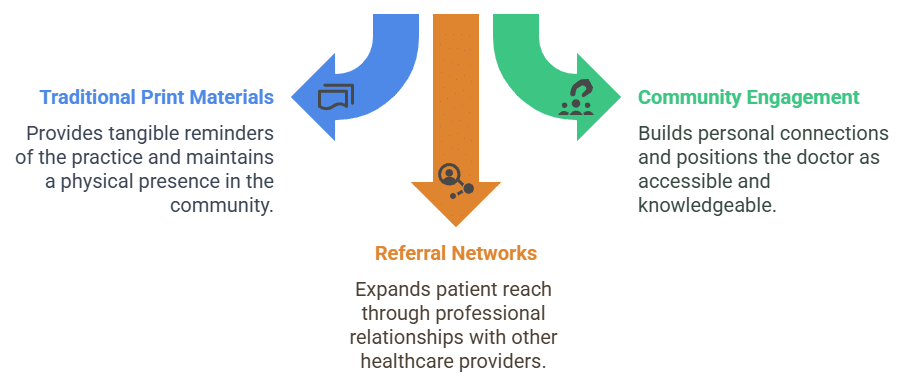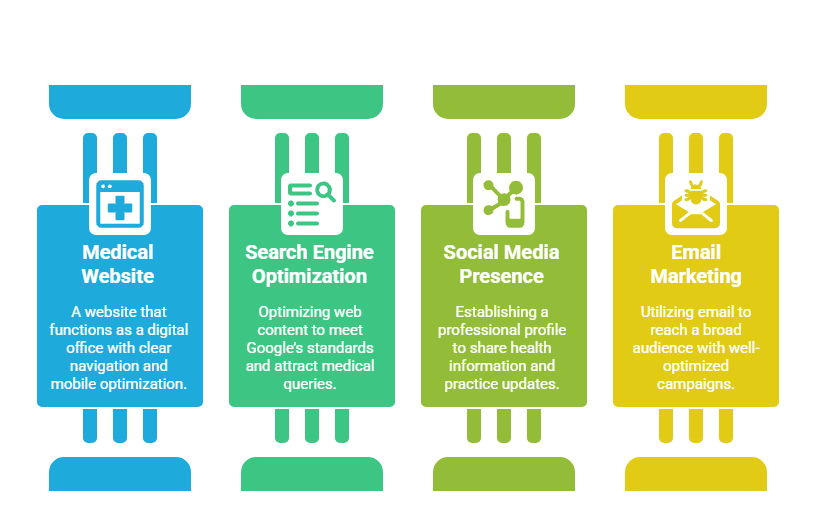Medical practice marketing isn’t easy, especially if you don’t plan to rely on a medical marketing agency.
If you’re just starting, you may not know what you’re doing and you may waste a lot of money waste a lot of money on ineffective marketing strategies.
Today, we will give you some golden tips on effective medical marketing to help you market your name online and offline.
This guide can be a great starting point for your medical business, but if you really want to take things to the next level, consider collaborating with Physicians Thrive.
Key Takeaways
- Doctors must tailor marketing strategies to specialty, goals, and patient audience.
- Offline marketing builds trust locally through print, referrals, and community events.
- A valuable website and SEO are essential for patient acquisition and retention.
- Email and social media marketing help engage, educate, and retain current patients.
Table of Contents
Why Is Marketing for Doctors Different?
Marketing is designed to attract , retain ,and convert . You have a particular product or service that you need to sell, and you use marketing to showcase whatever you have to sell in the best possible manner.
If you’re a merchant or a business owner, your marketing will circle around your product, how it delivers, and how it beats other products in its field.
Marketing for doctors revolves around the same idea, but the basic approach is fairly different. You’re not marketing your product ; you’re marketing your results .
In other words, you don’t market how good of a physician you are but how satisfied your patients become after receiving your treatment. However, this approach varies significantly across medical specialties. Let us explain.
It makes sense for a dentist to take before-and-after photos of their patients’ teeth to showcase their results. Maybe dermatologists can do the same for their patients after removing a skin lesion. But how can brain and heart surgeons do the same?
Marketing for doctors needs to be tailored to your specific specialty and target audience.
Let’s begin by talking about the two primary approaches you can take for marketing.
Why Is Marketing Necessary for Doctors?
We’ll refrain from stating the obvious, like increasing your ROI, getting your name out there, establishing yourself, and such. These are the basic reasons for marketing that everybody knows.
Instead, we’ll show you why medical marketing strategies “today” are more important than ever before.
Standing Out in a Competitive Market
You’d think that a country like the United States, which is notorious for having a shortage of physicians, would require no marketing to succeed, right?
While the country as a whole does face a physician shortage, certain metropolitan areas have high concentrations of specialists competing for the same patient population.
In these scenarios, marketing becomes the differentiator that helps patients choose your practice over others.
Patient Education and Expectation Management
Modern patients are more informed than ever before. They research symptoms online, read medical forums, and come to appointments with preconceived notions.
As a result, even patients with no medical background now commonly understand and respond to medical terminology.
If your specialty doesn’t allow you to visually market your work (like a neurosurgeon, for example), targeting these potential patients through educational marketing can be a remarkable asset.
Just make sure that you’re not using complex terminology that only fellow colleagues would understand. You’re only elevating the language you’re using somewhat to make educated patients feel that they’re personally approached, but you don’t want to overwhelm them.
Practice Growth and Sustainability
Even if you already have an established practice, you’ll need a consistent influx of new patients to remain viable. Many diseases are fully treatable, after all, and if you handle all your patients, you’ll have no work left.
Also, you may be an already established physician who just had to relocate. Marketing can help you pick up the pace a lot faster than relying on your reputation alone.
Retaining Existing Patients
Your financial success as a physician isn’t just about getting new patients but is also about ensuring that the existing ones don’t shift to another physician mid-treatment.
Email newsletters, follow-up campaigns, and loyalty programs remind patients of your value and encourage repeat visits or referrals.
Building Trust
An exceptional physician that nobody knows will stay in the shadow of an average physician whose name is everywhere.
People tend to connect authority with repetition. If they’re constantly seeing or hearing about a certain physician, they’ll subconsciously link their name or practice with authority.
Repetition in advertising can take your brand awareness to the next level and should never be overlooked.
How Does Marketing for Doctors Work?
Just like any regular marketing, your approach can be offline or online. Ideally, you should do both.
Offline Marketing Strategies for Doctors
As a medical professional, marketing for yourself locally has been the only approach until the introduction of online marketing in the 1990s. If anything, online marketing didn’t truly take over until 2006, when the search engine traffic blew off.
In other words, offline marketing has been working for hundreds of years, and while marketing strategies are being heavily directed to the online section, there’s still a lot you can do to market yourself as a doctor locally.
1. Traditional Print Materials
Despite the digital overtake on pretty much everything, printed materials remain effective for local medical marketing. Examples include:
- Professional business cards
- Brochures
- Informative pamphlets on common conditions you treat
These tangible materials serve as physical reminders of your practice long after patients leave your office.
2. Community Engagement and Events
While repetitive online marketing can attract people who connect frequency to authority, community engagement and events attract those who prefer face-to-face interactions .
Hosting or participating in community health fairs, giving educational talks at local venues, or even offering free health screenings position you as both accessible and knowledgeable.
If you don’t have access to many of these events around you, you may start them yourself by partnering with local schools, senior centers, or businesses.
3. Referral Networks with Fellow Physicians
We can’t stress enough how networking is necessary for the success of physicians. Building strong professional relationships with non-competing healthcare providers creates a powerful referral network.
Don’t make the mistake of marketing for yourself only to potential patients, especially if you’re a specialist. More than a third of patients in the U.S. are referred to specialists each year.
In 2022 alone, 126.9 million people visited doctors offices. A third of those yields a market of roughly 42 million patients that specialists who don’t network are potentially missing out on.
Online Marketing for Doctors
Digital marketing has become the bread and butter of any industry. With people spending countless hours daily behind a screen, you have a ripe ground to reach your target audience even if they’re not in your local zone.
Here are some of the strategies you could utilize:
1. A Medical Website of Value
If you have your own healthcare practice, chances are that you already have a website. You’d be surprised how many practices have a website just for the sake of having one.
Think of it like this: If your website doesn’t serve as a digital office, there’s room for improvement. Your website should handle everything your office staff would do, short of the actual patient examination.
Design it with clear navigation, prominently displayed contact information, space for genuine online reviews, and easy scheduling steps. Also, one important note that many doctors (and web developers) miss is making a website with mobile optimization in mind.
As of November 2024, over 60% of internet traffic came from mobile devices, a percentage you could potentially miss out on if you ignore mobile optimization.
2. Search Engine Optimization for Healthcare
No matter how valuable your website is, if your target audience doesn’t reach it, it won’t work, and that’s why you need SEO.
Search engine optimization or SEO, in short words, is how optimized your website or landing page is according to Google’s standards .
For example, if you have an item that you want to sell, you need to understand how users Google this item and list it in a way that meets Google’s criteria for fetching your website.
Optimizing for healthcare marketing is a bit different. Your target audience isn’t searching for products; they’re asking medical questions.
If you’re a podiatrist, your patients might Google something like: “Why does my foot hurt for no reason?” You’ll want your website to have that user query followed by an immediate answer to win that Google snippet and have the patient directed to your website for more information.
Once they get there, they must stay long enough for them to be impressed and book an appointment, which brings us back to the previous point: a website of value.
3. Professional Social Media Presence
Your target audience has found your name on your website and decided to look you up on social media. That’s when social media marketing comes in.
You should establish your online presence through various professional profiles on social media platforms where your patient demographic is active. There, you should share reputable health information, practice updates, quality control, etc.
You should also provide appropriate behind-the-scenes content that humanizes your practice so it won’t seem too salesy.
Once again, consider specialty-specific approaches. Visual specialties like dermatology and plastic surgery benefit from image-focused platforms like Instagram and YouTube. Conversely, primary care physicians might focus more on educational content across broader channels.
4. Email Marketing
Did you know that 92% of online adults utilize emails? Plus, 88% of email users check their inbox multiple times a day. Of course, not all of these will be interested in healthcare content marketing, but we’re just showing you the size of the market.
Email marketing remains significantly underutilized because many physicians worry their messages will be viewed as spam.
A spam sender is an account that has too many emails that nobody responds to. If your email marketing campaign isn’t well-optimized, your marketing efforts will be left out in the junk folder.
Optimized here means personalized. You’ll need a copywriter who can tap into your patients’ pain points, provide solutions, and create engaging content—all within the few seconds it takes to read an email.
Final Words
If you have a medical practice, you know firsthand that proper marketing will significantly vary depending on your specialty, practice size, location, competition, finances, etc.
Accordingly, any online guide that claims guaranteed success if you follow its tutorial isn’t legitimate. Guides are there to help, but they can’t possibly address your specific circumstances and challenges. One-size-fits-all solutions simply don’t work in medical marketing.
In other words, you’ll need someone who 1) is a doctor and 2) knows the best practices for medical marketing. Fortunately, you’ll get both if you collaborate with Physicians Thrive.
We’ve been advising doctors and guiding them toward financial success for years, providing all the services you’d need to take your practice to the next level. We can provide you with a customized marketing plan and many marketing channels you can utilize.
Contact us to get started, and allow us to help you grow your practice and bring it to life.









































